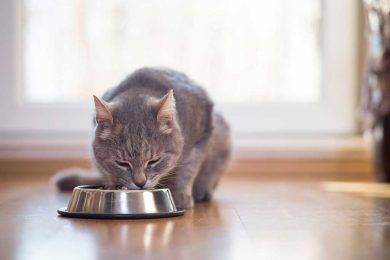The Basics
At the absolute most basic level, cats have 41 essential nutrients that they require. This is because they have a much shorter intestine than other animals such as dogs, which means that they are less able to digest plant material.
When you are trying to decide what foods you are going to get your cat, you need to consider the nutrition in the cats’ food. You might wonder what are the best cat foods in Walmart, or what you can do to better give your cat this nutrition. The first step is knowing what these nutrients are.
What nutrients do cats need?
Cats vary from other species in what they require as far as protein, amino acids, and vitamins to make a nutritional diet.
Protein is a very important nutrient which helps in building of body tissues such as muscle, and forms the basis for enzymes, which are needed for body function and prevents disease.
They also require amino acids, which are the individual components that make up a protein. Your furry feline has a higher requirement for both protein and amino acids than dogs do. They break down this protein very fast and cannot adapt when their dietary supplies are low.
They are super sensitive to developing deficiency in the amino acid arginine. This is an amino acid that is essential for metabolism and cats do not only break it down fast but cannot make their own. This is usually an issue if low protein is fed.
Another amino acid they need is taurine which they need for eyesight, heart function and bile formation. Female cats also need this for reproduction. They cannot make enough of this themselves, and rely on it being in their food. Remember that taurine comes from meat, protein, and shellfish, and so cats cannot be vegetarians!
Cats also need fatty acids, vitamin A, and Niacin or nicotinic acid.
However, you are hardly going to remember all these very complex words and reasoning, so now we will look at the things you know and what to look out for in cat food, so you know how best to feed your cat.
When we eat we know protein, fat, carbs, water, and so on. So, let’s translate this into something everyone can understand.
Animal Proteins
Remember, cats are carnivorous. This is why animal proteins are no.1 on this list and are absolutely essential. They can obtain all of those all important amino acids we mentioned from animal proteins, they help to keep everything in your cat’s body working and are a fundamental part of keeping your cat healthy.
Complete and balanced cat food should include animal protein from meats like turkey, chicken, or beef, as well as fish and eggs. Feeding your cat a well-balanced diet assists in the healthy functioning and generation of their tissues, claws, and fur.
Fats
Fats are an energy source, and for cats they are the primary source of energy. Good fats are any fats that are naturally present in meat and fish, as well as the significant fatty acids such as Omega 3 and Omega 6. These are imperative to feline health.
They actually help your cat maintain their body temperature, provide energy and help them to absorb other vitamins they need such as Vitamins A, D, E, and K.
Carbohydrates
While carbs are not really seen as essential nutrition in a cat diet, they do play important roles in your cat’s body. They provide a highly digestible, readily available energy source, and they should be present in all cat foods.
Cats get all their needed carbs from things such as wheat and rice. As these grains are typically added to many wet cat foods, they are pre-treated to help facilitate digestibility and absorption.
Avoid carbs such as uncooked soybeans and other legumes like the plague, as these can have a negative effect on your cat.
Water
Water is obviously a major need for any animal. Seemingly a no-brainer. But cats often drink less water than they actually need too. 70% of a cat is water, and in the past, cats lived in natural environments with restricted access to clean water, through their evolution cats adapted to this by obtaining most of the water they need through the food they eat.
This is why wet cat food is so important.
Vitamins
We need vitamins, and so do our cats, they need Vitamins A, D, B1, B2, B3, and B6. These are often found in complete and balanced wet cat food diets, but it does not hurt to check for these as they are vital to cat health.
My name is Sardar Ayaz a professional content writer and SEO expert having Proven record of excellent writing demonstrated in a professional portfolio Impeccable grasp of the English language, including idioms and current trends in slang and expressions. I have ability to work independently with little or no daily supervision with strong interpersonal skills and willingness to communicate with clients, colleagues, and management.
I can produce well-researched content for publication online and in print, organize writing schedules to complete drafts of content or finished projects within deadlines. I have 12 years’ experience to develop related content for multiple platforms, such as websites, email marketing, product descriptions, videos, and blogs.
I use search engine optimization (SEO) strategies in writing to maximize the online visibility of a website in search results











